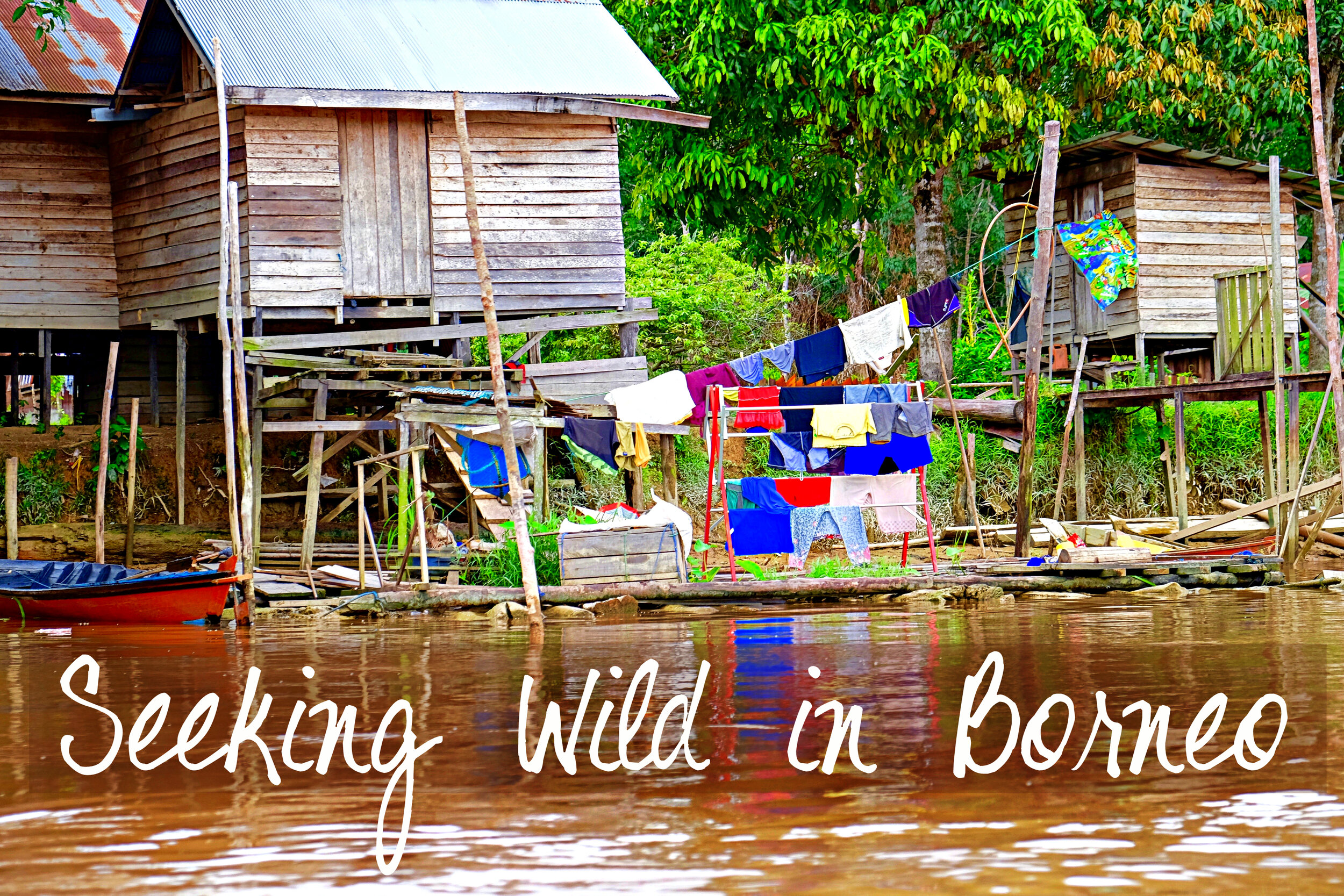Seeking Wild in Borneo
Every year my business and personal life take on a banner theme. A couple years ago it was authentic power. Last year, of course, all things warrior and while these themes are invocations at the New Year, perhaps they are also an initiation to a greater intention for living.This year’s theme is Seeking Wild.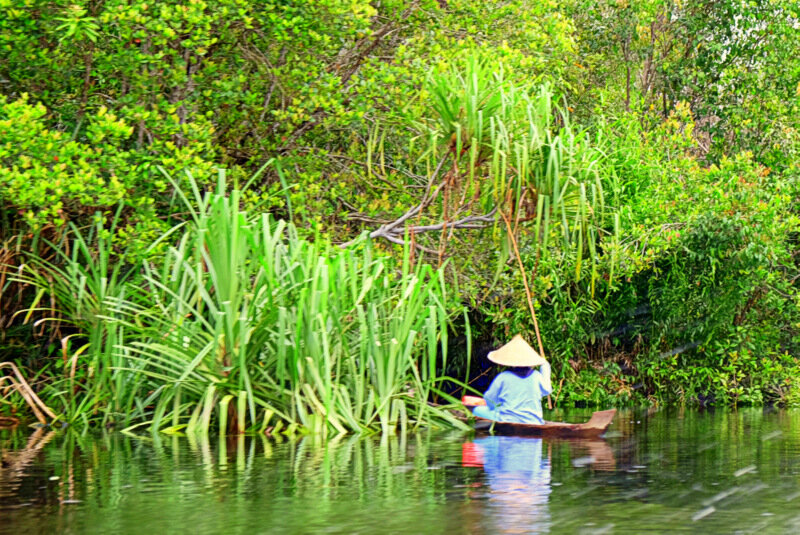
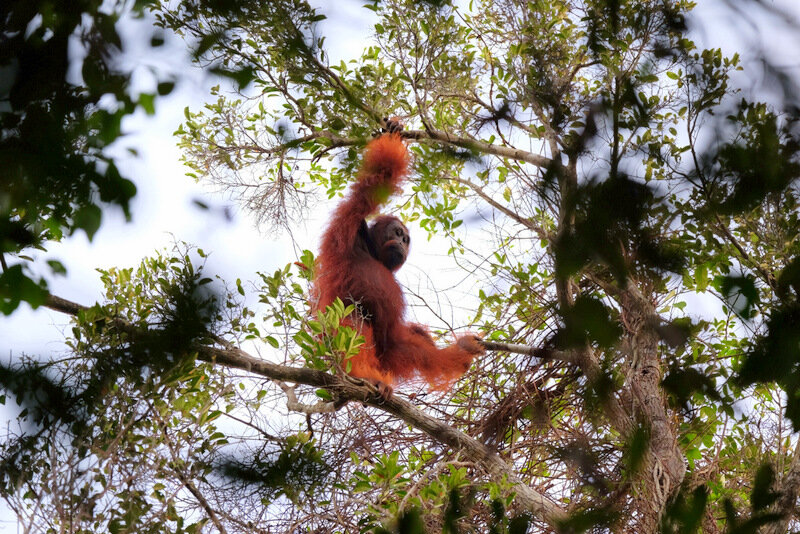 Wild places within and around you, seek them out. Find them. Protect them and the gifts that lie deep in those wild places. Your natural, wild self has desires, expressions and a life waiting to be lived. Seeking my wild has led me on a trip around the world. I am currently well into month four and just checked off a huge bucket list item: orangutans in Borneo.
Wild places within and around you, seek them out. Find them. Protect them and the gifts that lie deep in those wild places. Your natural, wild self has desires, expressions and a life waiting to be lived. Seeking my wild has led me on a trip around the world. I am currently well into month four and just checked off a huge bucket list item: orangutans in Borneo.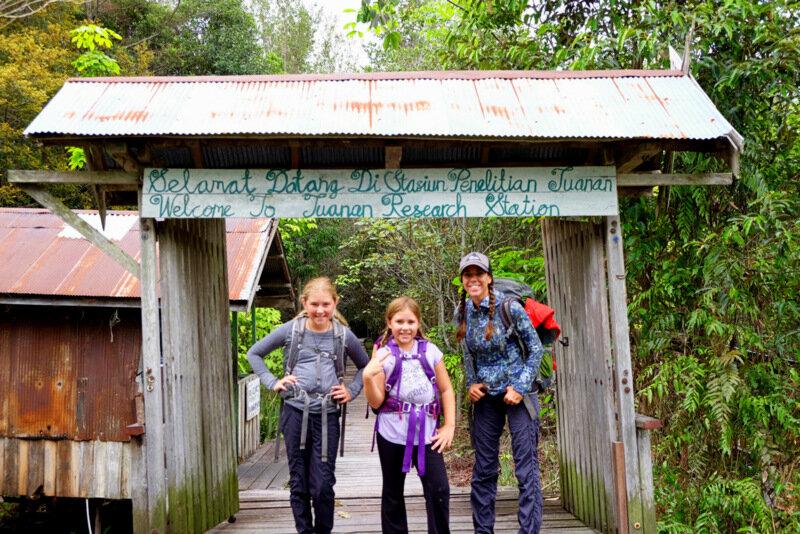 There is no greater charge I get than spending time away from it all in nature…the deeper, the better. Throw wild animals in the mix and I’m in heaven. There is scientific proof that time in natural places has stress reducing, health-inducing benefits on the body from increased vitality to lowered heart rate and blood pressure. In the jungle, oh, the infusion of plant-powered oxygen boosts is invigorating. Of course not all outdoor activities have a calming effect, some are meant to be heart-racing adventures that have a very positive effect on your fun factor!
There is no greater charge I get than spending time away from it all in nature…the deeper, the better. Throw wild animals in the mix and I’m in heaven. There is scientific proof that time in natural places has stress reducing, health-inducing benefits on the body from increased vitality to lowered heart rate and blood pressure. In the jungle, oh, the infusion of plant-powered oxygen boosts is invigorating. Of course not all outdoor activities have a calming effect, some are meant to be heart-racing adventures that have a very positive effect on your fun factor!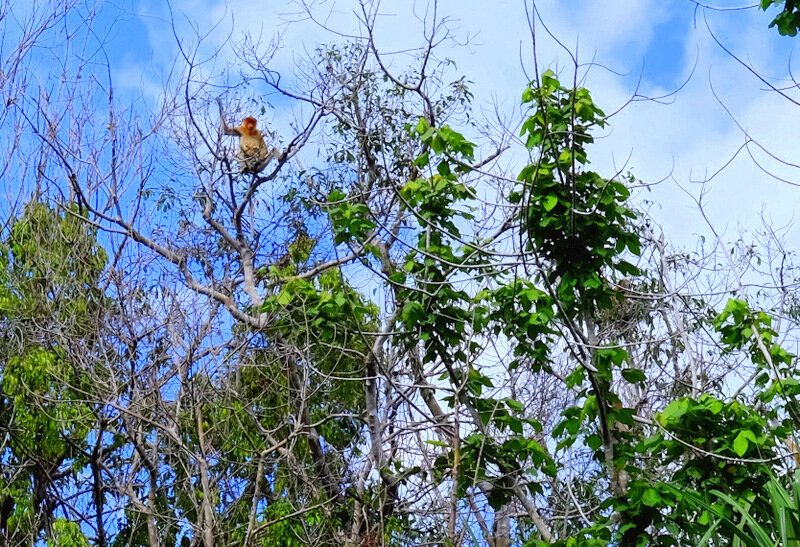 This journey to the jungle of Borneo was one of the most meaningful, remote and wild adventures of my life. I mean, who gets to collect the urine and feces of these gentle ape giants? Living the dream!First, dream come true was to see what my dear friend, Erin Vogel, has dedicated her life to, and second, it was an incredibly uplifting, tear-jerkingly joyful and equally challenging, heartbreaking experience. And that’s life. The good and bad make the real.
This journey to the jungle of Borneo was one of the most meaningful, remote and wild adventures of my life. I mean, who gets to collect the urine and feces of these gentle ape giants? Living the dream!First, dream come true was to see what my dear friend, Erin Vogel, has dedicated her life to, and second, it was an incredibly uplifting, tear-jerkingly joyful and equally challenging, heartbreaking experience. And that’s life. The good and bad make the real.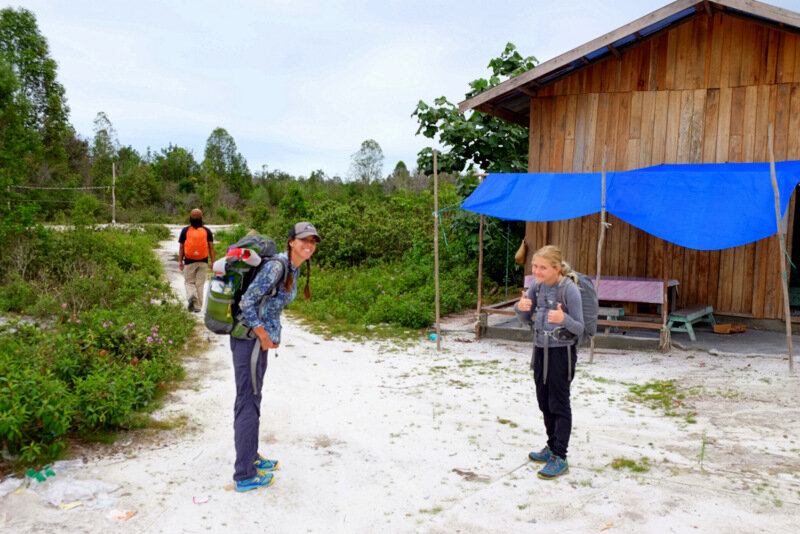 Every day, every DAMN day, species are going extinct. We cared too little about some of these species’ wild places and wild beating hearts to make them last another generation. Borneo and Sumatra are the only places that wild orangutans are left. There are less than a total of 50,000 out there. In my brief journey to the jungle for a couple days in the forest we managed to see six of them, along with gibbons (one of the lesser know ape species), proboscis monkeys (had never even heard of them before!) and macaques.I carry a lot of pain in my heart about the way we, as a species, treat our planet. I first became vegan when I was 19 because I was ashamed of the way my father had made a living, in the fish business, and I felt I had to atone for my fortune. I continue to be plant-based today because I know it is the only truly compassionate and sustainable way of living for our planet as a whole. We have too many suffering animals on the planet and the more we contribute to the suffering, the less well we are as individuals.
Every day, every DAMN day, species are going extinct. We cared too little about some of these species’ wild places and wild beating hearts to make them last another generation. Borneo and Sumatra are the only places that wild orangutans are left. There are less than a total of 50,000 out there. In my brief journey to the jungle for a couple days in the forest we managed to see six of them, along with gibbons (one of the lesser know ape species), proboscis monkeys (had never even heard of them before!) and macaques.I carry a lot of pain in my heart about the way we, as a species, treat our planet. I first became vegan when I was 19 because I was ashamed of the way my father had made a living, in the fish business, and I felt I had to atone for my fortune. I continue to be plant-based today because I know it is the only truly compassionate and sustainable way of living for our planet as a whole. We have too many suffering animals on the planet and the more we contribute to the suffering, the less well we are as individuals.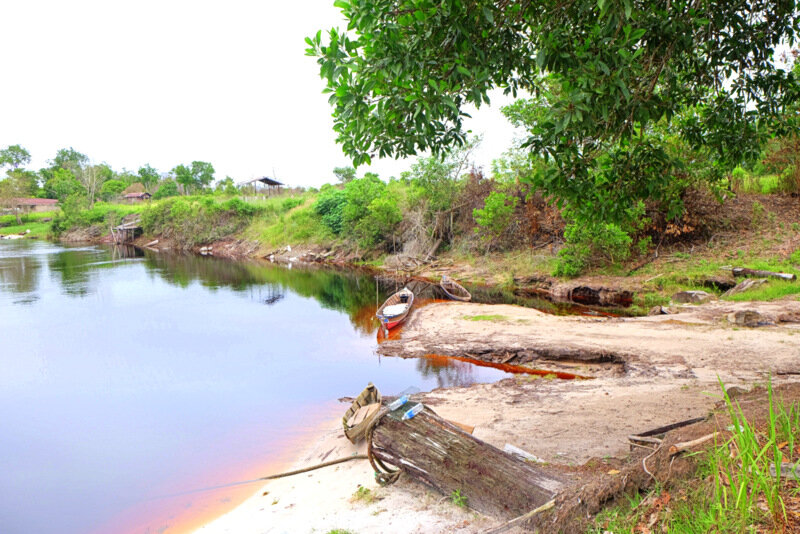 How well can we be when we are killing off our wild places?
How well can we be when we are killing off our wild places?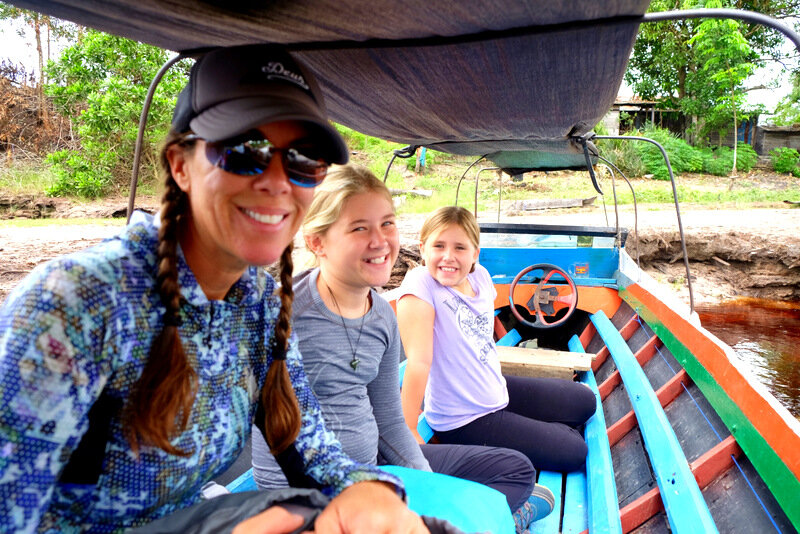 We traveled through palm oil HELL, which is destroying the orangutan habitat…if you don’t know the dangers and ills of that business, read about it and how to avoid products with palm oil. It’s nasty stuff and the production of it is rapidly destroying wild places in addition to Borneo. Thankfully, we didn’t spend much time in the ravaged lands and were able to see the more thriving, albeit threatened orangutan habitat.
We traveled through palm oil HELL, which is destroying the orangutan habitat…if you don’t know the dangers and ills of that business, read about it and how to avoid products with palm oil. It’s nasty stuff and the production of it is rapidly destroying wild places in addition to Borneo. Thankfully, we didn’t spend much time in the ravaged lands and were able to see the more thriving, albeit threatened orangutan habitat.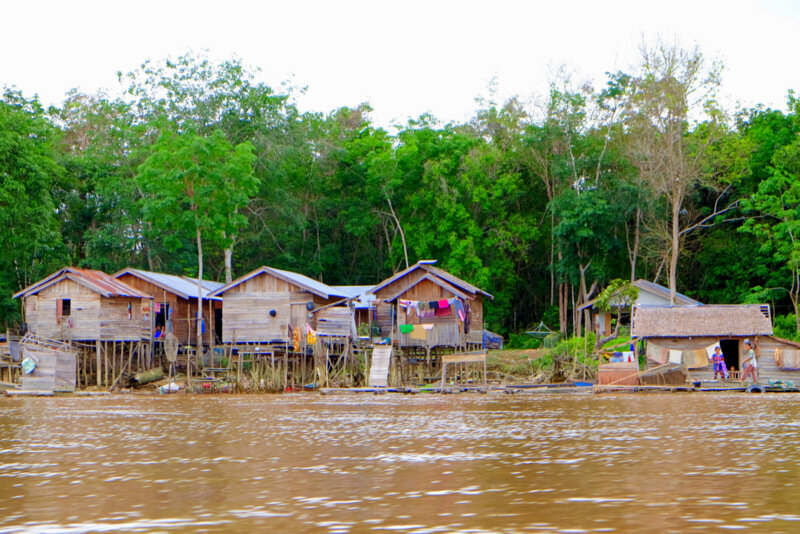 This journey affirmed what I speak to so much, the healing power of nature. Well, I didn’t know I had been suffering from Dengue Fever the week before I was to take this trip to Borneo. I had decided to do a juice cleanse because, well, Ubud in Bali is the perfect place to do such a thing. When I was literally knocked on my ass and in bed for days, thinking, well I have no idea how a vegan, organic plant eater could get so toxic, I rode it out, wishing, not so secretly, that I had a morphine drip. I was worried I was going to have to send my family to Borneo without me. I felt that bad! But, thankfully, things began to look up just the day before we were to head out. It was a clearing sky after a dark storm. The buzz I felt following our time in the jungle had an energy lifting effect on me. Even though my body still felt weak and heavy, my spirit was soaring.
This journey affirmed what I speak to so much, the healing power of nature. Well, I didn’t know I had been suffering from Dengue Fever the week before I was to take this trip to Borneo. I had decided to do a juice cleanse because, well, Ubud in Bali is the perfect place to do such a thing. When I was literally knocked on my ass and in bed for days, thinking, well I have no idea how a vegan, organic plant eater could get so toxic, I rode it out, wishing, not so secretly, that I had a morphine drip. I was worried I was going to have to send my family to Borneo without me. I felt that bad! But, thankfully, things began to look up just the day before we were to head out. It was a clearing sky after a dark storm. The buzz I felt following our time in the jungle had an energy lifting effect on me. Even though my body still felt weak and heavy, my spirit was soaring. I had spent months with my friend and orangutan guru, Erin, planning this trip. Erin was always a force, ever the scientist, hard-working and brilliant at once. At all of 4’11 (and a half inches), she stood taller than any student I knew back at Colby College 25 years ago. She knew then she was going to be a primatologist and today, she is at once expert doctor of primates with a following around the world looking up to her. I loved being out in the forest in Borneo as morning was slowly breaking, with a Ph.D researcher from the U.S. ooohing and aaaahing about Erin; then shyly admitting with a grin, “Erin is my hero”.
I had spent months with my friend and orangutan guru, Erin, planning this trip. Erin was always a force, ever the scientist, hard-working and brilliant at once. At all of 4’11 (and a half inches), she stood taller than any student I knew back at Colby College 25 years ago. She knew then she was going to be a primatologist and today, she is at once expert doctor of primates with a following around the world looking up to her. I loved being out in the forest in Borneo as morning was slowly breaking, with a Ph.D researcher from the U.S. ooohing and aaaahing about Erin; then shyly admitting with a grin, “Erin is my hero”.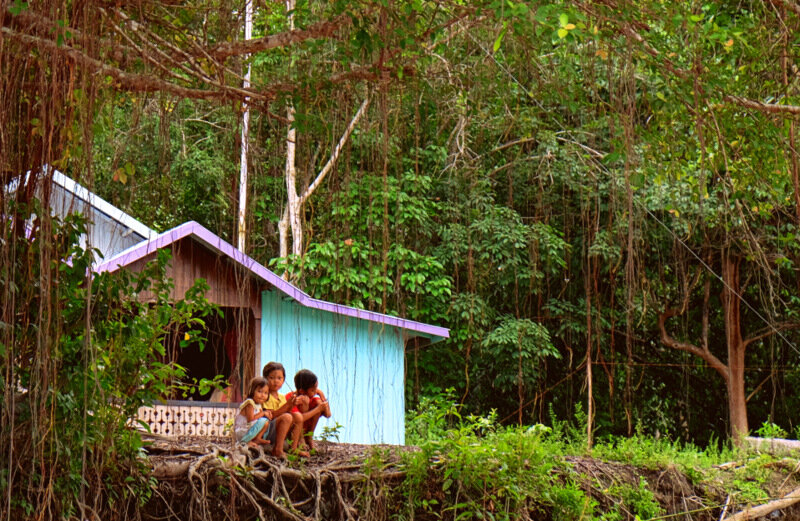 People like Erin didn’t (they almost never) do it for the fame and recognition. I think back in college in my off and on state of confidence, I was jealous of Erin’s drive and direction. I didn’t think I could keep up with her. Now, I am so glad we have remained friends throughout the years. I couldn’t be more proud to know her and acknowledge the incredible work she is doing for orangutans and her contribution to conservation biology.
People like Erin didn’t (they almost never) do it for the fame and recognition. I think back in college in my off and on state of confidence, I was jealous of Erin’s drive and direction. I didn’t think I could keep up with her. Now, I am so glad we have remained friends throughout the years. I couldn’t be more proud to know her and acknowledge the incredible work she is doing for orangutans and her contribution to conservation biology.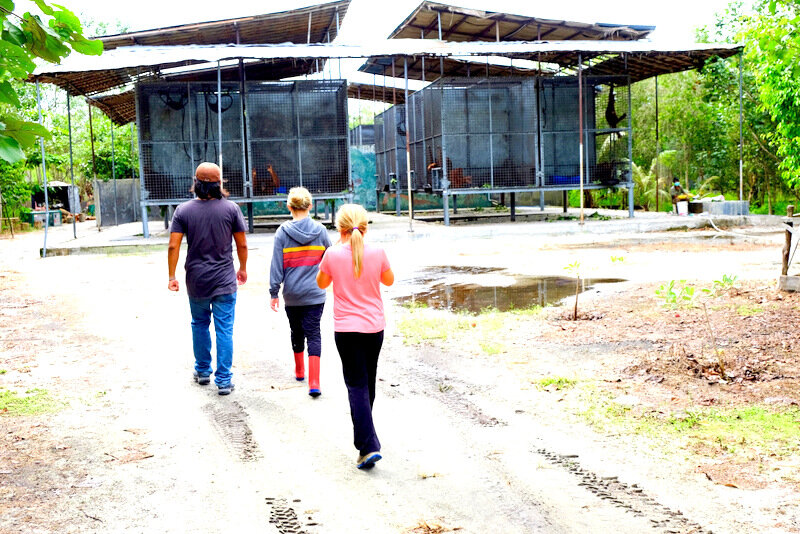 I am grateful to have incredible friends like her who have devoted their lives to work for the wild. With more and more of my unique and poignant wildlife experiences, I am evolving into the crusader I was meant to be. Wild lands and our wild minds need space to be free.A lot needs to be done to protect these wild places in Borneo. The recent fires have brought the orangutans to the river, the curious eyes and dark faces of these red-haired People of the Forest are too easily seen along the river. They don’t belong there. There isn’t enough food or habitat for them, but they are desperate and the fires have forced them into these narrow, exposed corridors, easy targets for poachers. I felt so much better seeing them in their deeper, more protected habitat in Tuanan, a conservation area earned after much hard work by Erin’s team of researchers. I felt a childlike curiosity hearing the cracking braches and seeing trees swaying (just like in the movies) as the easy moving long-armed orangutans maneuvered their way among the tree tops. I was relieved to see the plentiful Tutup Kabali fruit and vines they could find out there. One of the orangutans we followed for six hours grazed continually.
I am grateful to have incredible friends like her who have devoted their lives to work for the wild. With more and more of my unique and poignant wildlife experiences, I am evolving into the crusader I was meant to be. Wild lands and our wild minds need space to be free.A lot needs to be done to protect these wild places in Borneo. The recent fires have brought the orangutans to the river, the curious eyes and dark faces of these red-haired People of the Forest are too easily seen along the river. They don’t belong there. There isn’t enough food or habitat for them, but they are desperate and the fires have forced them into these narrow, exposed corridors, easy targets for poachers. I felt so much better seeing them in their deeper, more protected habitat in Tuanan, a conservation area earned after much hard work by Erin’s team of researchers. I felt a childlike curiosity hearing the cracking braches and seeing trees swaying (just like in the movies) as the easy moving long-armed orangutans maneuvered their way among the tree tops. I was relieved to see the plentiful Tutup Kabali fruit and vines they could find out there. One of the orangutans we followed for six hours grazed continually.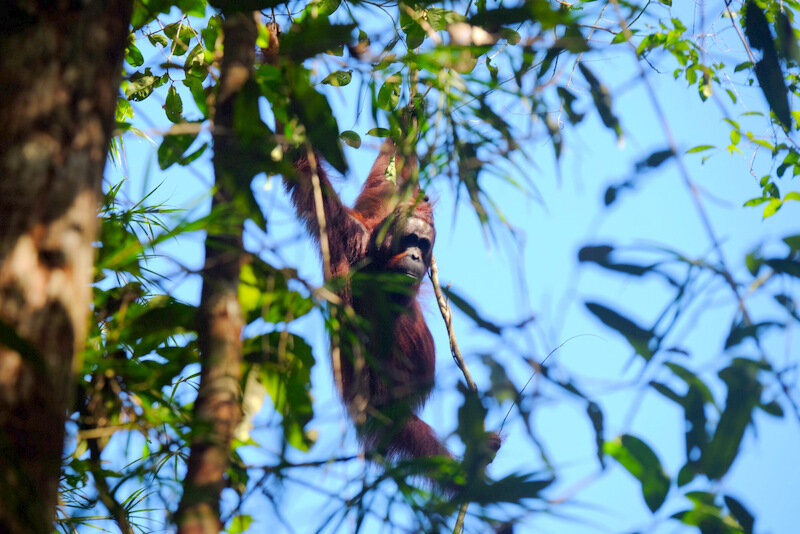 The Borneo we experienced was not a tourist destination. I wonder if it were, would there be more protection for the forest or just more of a human-made mess? Maybe there would be more motivation from the local government to protect the wildlife if they knew it would bring money in to the area, instead of the palm oil interests bulldozing the region? If you want to add your voice to the many who would like to preserve the forest, you can take action here. But there is not a tourist scene whatsoever; I am glad, believe me. It was a welcome diversion, after being in Bali among the land of tourism to be the only visitors. So much so, wherever we went, people were asking to be photographed with my blond-haired, green-eyed younger daughter, from the taxi driver to random locals wherever we went!
The Borneo we experienced was not a tourist destination. I wonder if it were, would there be more protection for the forest or just more of a human-made mess? Maybe there would be more motivation from the local government to protect the wildlife if they knew it would bring money in to the area, instead of the palm oil interests bulldozing the region? If you want to add your voice to the many who would like to preserve the forest, you can take action here. But there is not a tourist scene whatsoever; I am glad, believe me. It was a welcome diversion, after being in Bali among the land of tourism to be the only visitors. So much so, wherever we went, people were asking to be photographed with my blond-haired, green-eyed younger daughter, from the taxi driver to random locals wherever we went!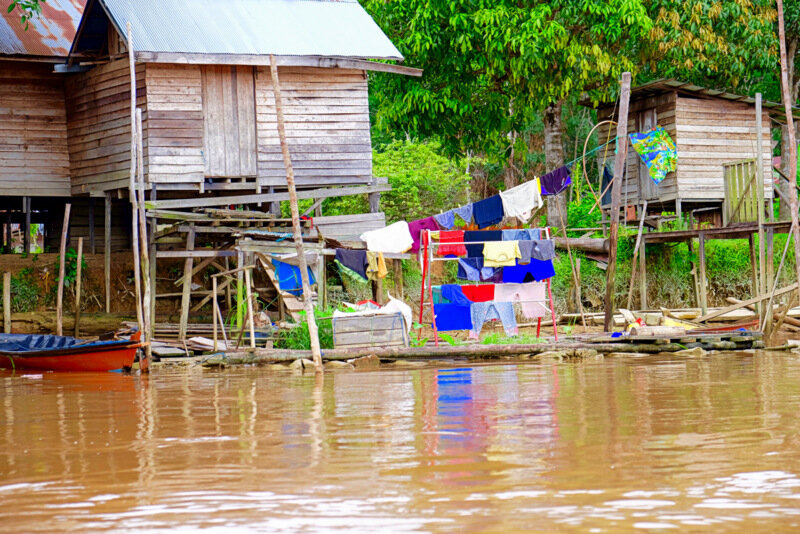 When we arrived in Palangkaraya, Kalimantan, Didik Prasetyo, a Ph.D researcher at Rutgers University and working with the Borneo Orangutan Survival Foundation (BOSF) met us at the airport. It was nice to have a friendly greeting before we made it to the hotel for rest before the early morning journey to the forest.
When we arrived in Palangkaraya, Kalimantan, Didik Prasetyo, a Ph.D researcher at Rutgers University and working with the Borneo Orangutan Survival Foundation (BOSF) met us at the airport. It was nice to have a friendly greeting before we made it to the hotel for rest before the early morning journey to the forest.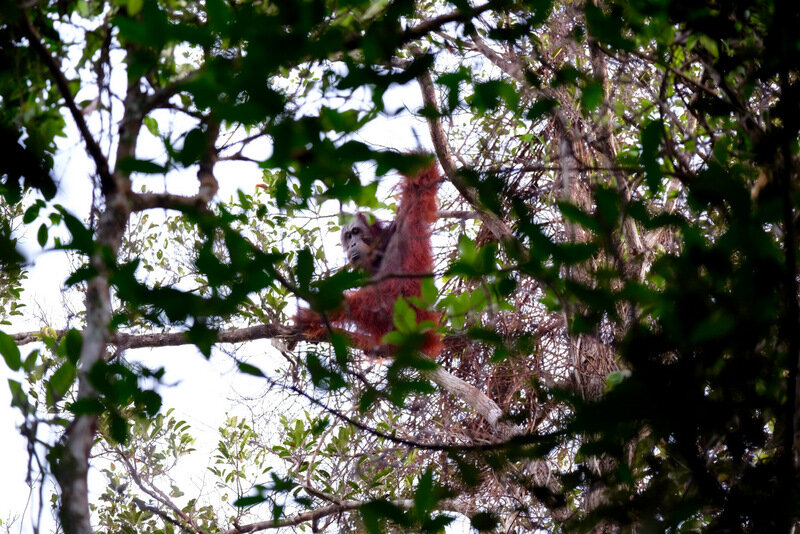 BOSF is an Indonesian non-profit working to protect and rehabilitate poached and orphaned orangutans and return them to their habitat. This is obviously no small task, as animals are not considered a high priority in Indonesia. Well, let me take that back, animals are used as status symbols. Birds are kept in cages and baby orangutans are kept captive as pets until they get too big to handle. The babies, orphaned and left vulnerable because their mothers were killed by poachers, if lucky to be rescued by BOSF, must live in the rehab (cages) for nearly six years, attending “forest skills school” and being cared for, until they are able to be reintroduced to the wild. Orangutans live with their mothers until they are able to be independent for at least six years, so BOSF has a lot of work keeping the animals skilled enough to be returned to the wild, fed and nurtured.I was relieved to learn that our report of the three orangutans we saw along the river initiated an immediate rescue. The next day BOSF sent a team to relocate the marooned orangutans to better locations.
BOSF is an Indonesian non-profit working to protect and rehabilitate poached and orphaned orangutans and return them to their habitat. This is obviously no small task, as animals are not considered a high priority in Indonesia. Well, let me take that back, animals are used as status symbols. Birds are kept in cages and baby orangutans are kept captive as pets until they get too big to handle. The babies, orphaned and left vulnerable because their mothers were killed by poachers, if lucky to be rescued by BOSF, must live in the rehab (cages) for nearly six years, attending “forest skills school” and being cared for, until they are able to be reintroduced to the wild. Orangutans live with their mothers until they are able to be independent for at least six years, so BOSF has a lot of work keeping the animals skilled enough to be returned to the wild, fed and nurtured.I was relieved to learn that our report of the three orangutans we saw along the river initiated an immediate rescue. The next day BOSF sent a team to relocate the marooned orangutans to better locations.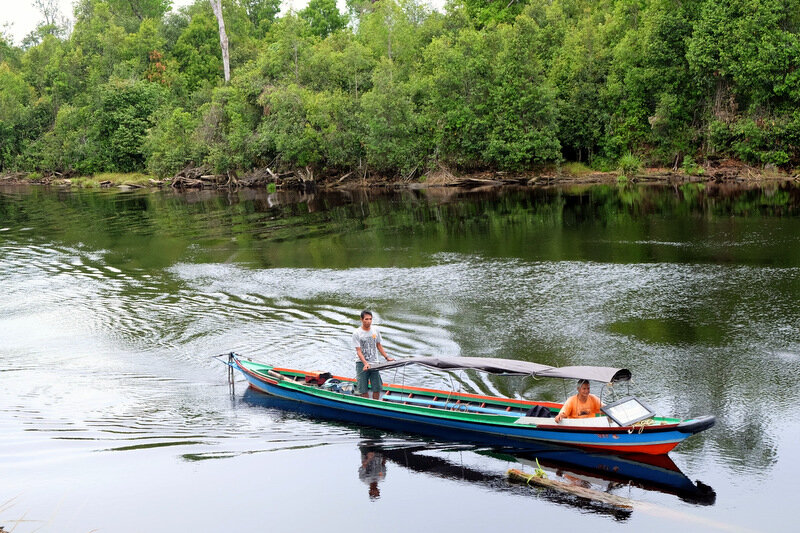 The researchers and team at Tuanan are an incredibly dedicated group, living in hot, buggy, remote conditions five hours from the nearest town.
The researchers and team at Tuanan are an incredibly dedicated group, living in hot, buggy, remote conditions five hours from the nearest town.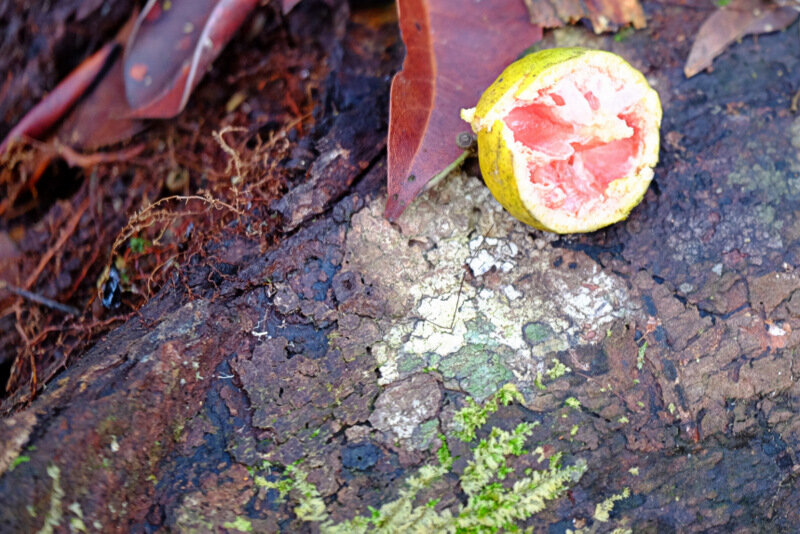 While we got lucky with the dry weather, it was still intense and draining. I was moving slowly, in post-Dengue recovery-mode. The heat was stifling, but at least we didn’t get hours of pummeling rain while navigating the river in the (insanely loud) klotok boat. The rains drained from the sky the entire night after we got back to our hotel. I felt for our new friends at the Tuanan research camp that still get up at o’dark hour to follow the orangutans, collecting urine and feces (yup, was a part of that), for up to 14 hours a day in torrential rain or sweltering shine. Can you say commitment to seeking wild and passion?
While we got lucky with the dry weather, it was still intense and draining. I was moving slowly, in post-Dengue recovery-mode. The heat was stifling, but at least we didn’t get hours of pummeling rain while navigating the river in the (insanely loud) klotok boat. The rains drained from the sky the entire night after we got back to our hotel. I felt for our new friends at the Tuanan research camp that still get up at o’dark hour to follow the orangutans, collecting urine and feces (yup, was a part of that), for up to 14 hours a day in torrential rain or sweltering shine. Can you say commitment to seeking wild and passion?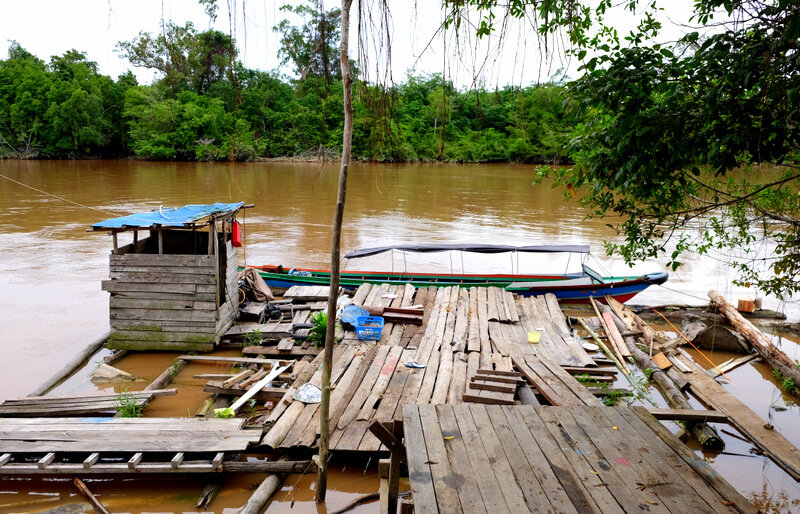 There are people that take risks so that others who cannot speak for themselves can simply live. It is the dreamers and the doers who have my enduring admiration, living among the People of the Forest, I honor them and the efforts they make to make our world a place of beauty, diversity and compassion.Whatever makes you come alive in this coming year (and beyond) do it! Seek the wild passion that makes you admire the dreamers and doers and let that inspire you to become one yourself.
There are people that take risks so that others who cannot speak for themselves can simply live. It is the dreamers and the doers who have my enduring admiration, living among the People of the Forest, I honor them and the efforts they make to make our world a place of beauty, diversity and compassion.Whatever makes you come alive in this coming year (and beyond) do it! Seek the wild passion that makes you admire the dreamers and doers and let that inspire you to become one yourself.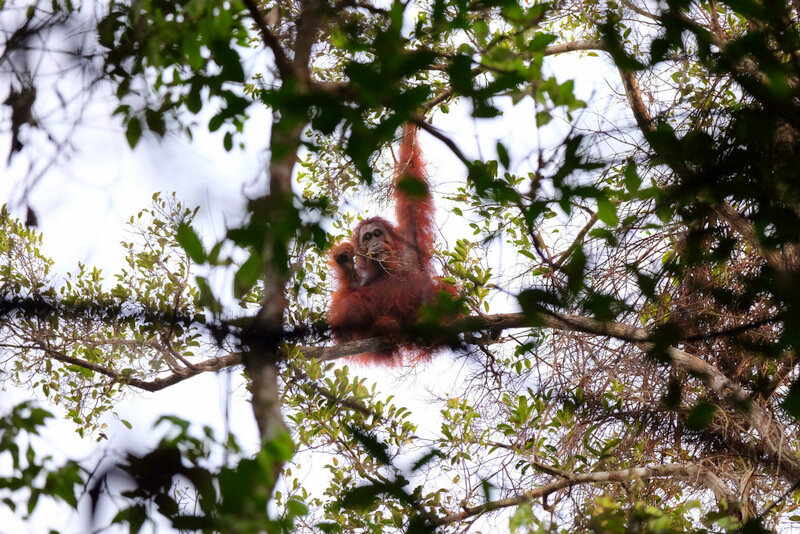 In the meantime, if you feel the call to action, join me in supporting this incredibly worthy cause. Not all of us can endure the conditions that this dedicated team does in Tuanan for the sake of wildlife and wild places.Help a brother and sister ape out…they’re closer to us than you think, and our compassion contributes directly to our wellness.Keep it wild.In loving-kindness,JillTo Donate to Tuanan, Click here: https://coreborneo.wordpress.com/donate/ For more information on the conservation work in Borneo, Click here: https://www.facebook.com/COREBorneo/
In the meantime, if you feel the call to action, join me in supporting this incredibly worthy cause. Not all of us can endure the conditions that this dedicated team does in Tuanan for the sake of wildlife and wild places.Help a brother and sister ape out…they’re closer to us than you think, and our compassion contributes directly to our wellness.Keep it wild.In loving-kindness,JillTo Donate to Tuanan, Click here: https://coreborneo.wordpress.com/donate/ For more information on the conservation work in Borneo, Click here: https://www.facebook.com/COREBorneo/

